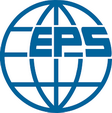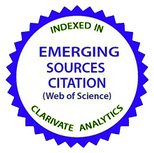Modeling of structural and energetic parameters of р-Er1-xScxNiSb semiconductor
DOI:
https://doi.org/10.15330/pcss.22.3.509-515Keywords:
semiconductor, electrical conductivity, thermopower coefficient, Fermi lervelAbstract
The energy expediency of the existence of Er1-xScxNiSb substitutional solid solution up to the concentration x≈0.10 was established by modeling the variation of free energy ΔG(x) values (Helmholtz potential). At higher Sc concentrations, x> 0.10, there is stratification (spinoidal decomposition of phase). It is shown that in the structure of p-ErNiSb semiconductor there are vacancies in positions 4a and 4c of Er and Ni atoms, respectively, generating structural defects of acceptor nature. The number of vacancies in position 4a is twice less than in position 4c. This ratio also remains for p-Er1-xScxNiSb. Doping of p-ErNiSb semiconductor by Sc atoms by substitution of Er atoms is also accompanied by the occupation of vacancies in position 4a. In this case, Ni atoms occupy vacancies in position 4c, which can be accompanied by the process of ordering the p-Er1-xScxNiSb structure. Occupation of vacancies by Sc and Ni atoms leads to an increase of the concentration of free electrons, an enlarge of the compensation degree of semiconductor, which changes the position of the Fermi level εF and the mechanisms of electrical conductivity.
References
I. Karla, J. Pierre, R.V. Skolozdra, J. Alloys Compd. 265, 42 (1998); https://doi.org/10.1016/S0925-8388(97)00419-2.
D. Kaczorovskii, V.V. Romaka, L. Romaka, A. Нoryn, V. Kovbasyuk, Yu. Stadnyk, XV Intern. Conf. Physics and Technology of Thin Films and Nanosystems, May 11-16, Ivano-Frankivsk, Ukraine (2015). P. 360.
V.V. Romaka, L. Romaka, A. Horyn, P. Rogl, Yu. Stadnyk, N. Melnychenko, M. Orlovskyy, V. Krayovskyy, J. Sol. St. Chem, 239, 145 (2016); https://doi.org/10.1016/j.jssc.2016.04.029).
V.V. Romaka, L. Romaka, A. Horyn, Yu. Stadnyk, J. Alloys Compd. 855, 157334 (2021); https://doi.org/10.1016/j.jallcom.2020.157334.
A.V. Morozkin V.N. Nikiforov, J. Alloys Compd. 400, 63 (2005); https://doi.org/10.1016/j.jallcom.2005.04.012.
V.A. Romaka, Yu.V. Stadnyk, V.Ya. Krayovskyy, L.P. Romaka, O.P. Guk, V.V. Romaka, M.M. Mykyychuk, A.M. Horyn, The latest heat-sensitive materials and temperature transducers (Lviv Polytechnic Publishing House, Lviv, 2020). ISBN 978-966-941-478-6. [in Ukrainian].
V.V. Romaka, L.P. Romaka, V.Ya. Krayovskyy, Yu.V. Stadnyk, Stannides of rare earths and transition metals (Lviv Polytechnic Publishing House, Lviv, 2015). ISBN 978-617-607-816-6. [in Ukrainian].
V. Krayovskyy, V. Pashkevych, A. Horpenuk, V.A. Romaka, Yu. Stadnyk, L. Romaka, А. Horyn, V. Romaka, Measuring equipment and metrology 82(2), 16 (2021).
I. Wolanska, K. Synoradzki, K. Ciesielski, K. Zaleski, P. Skokowski, D. Kaczorowski, Mater. Chem. Phys. 227, 29 (2019); https://doi.org/10.1016/j.matchemphys.2019.01.056.
K. Synoradzki, K. Ciesielski, I. Veremchuk, H. Borrmann, P. Skokowski, D. Szymanski, Y. Grin, D. Kaczorowski, Materials 12, 1723 (2019); https://doi.org/10.3390/ma12101723.
M. Schruter, H. Ebert, H. Akai, P. Entel, E. Hoffmann, G. Reddy, Phys. Rev. 52, 188 (1995).
V.L. Moruzzi, J.F. Janak, A.R. Williams, Calculated electronic properties of metals (NY, Pergamon Press, 1978).
T. Roisnel, J. Rodriguez-Carvajal, Mater. Sci. Forum, Proc. EPDIC7 378-381, 118 (2001); https://doi.org/10.4028/www.scientific.net/MSF.378-381.118.
L. Zeng, L. Nong, J. Li, Y. Zhuang, J. Hao, Powder Diffr. 11, 40 (1996); https://doi.org/10.1017/S0885715600008897.









